5 Major Differences Between Open Water Swimming and Pool Swimming
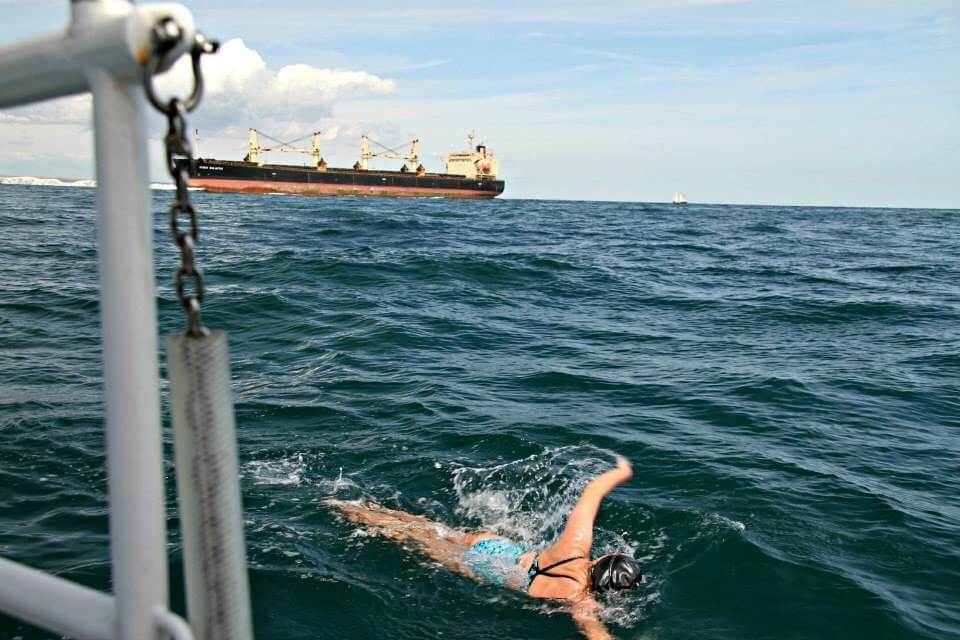
By Abby Bergman, Swimming World College Intern
While open water swimming and pool swimming are both part of the same larger sport, there are many differences between the two that many swimmers may not be fully aware of. Through interviews with marathon swimmer and former English Channel record holder Lynne Cox, English Channel Swimmer and former Smith College swim team captain Paige Christie, and Head Coach of Team Santa Monica and member of the 2016 Rio Olympic Games Coaching Staff Dave Kelsheimer, I have compiled a list of some the major differences between pool swimming and open water swimming.
1. Mental Preparation
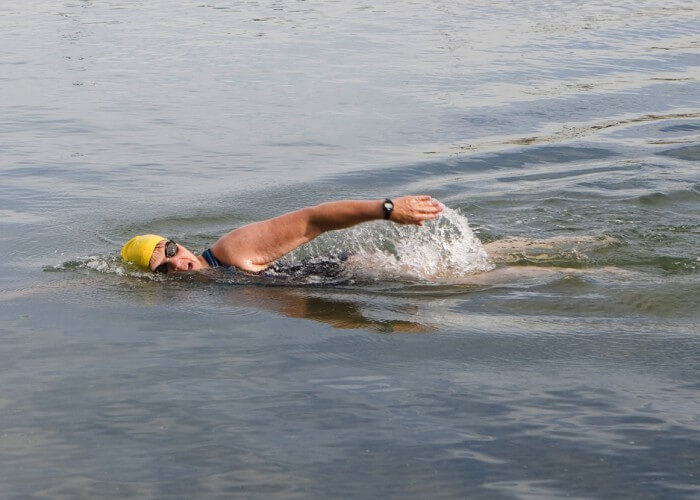
Lynne Cox swims in open water. Photo Courtesy: Lynne Cox
Mental preparation is important for both pool and open water swimmers, but takes somewhat different forms in each context. Cox describes how swimmers who train to primarily compete in the pool can have doubts in their ability to achieve a goal time or place on any given day, “but they can be fairly certain that they will be able to complete their races.”
This is in striking contrast with the anxiety of open water swimmers, who must also deal with the possibility that they may not finish their swim or even be able to start based on conditions. Cox explains the difference when she says, “There is no guarantee that they will be able to complete a channel swim or long distance swim, and unlike pool swimmers that can compete in the next swim meet and improve their times, open water swimmers may only have one opportunity to achieve their goals.” By understanding the mental aspects of both pool and open water swimming, athletes can best prepare for whichever pursuit they choose to undertake.
2. Physical Preparation
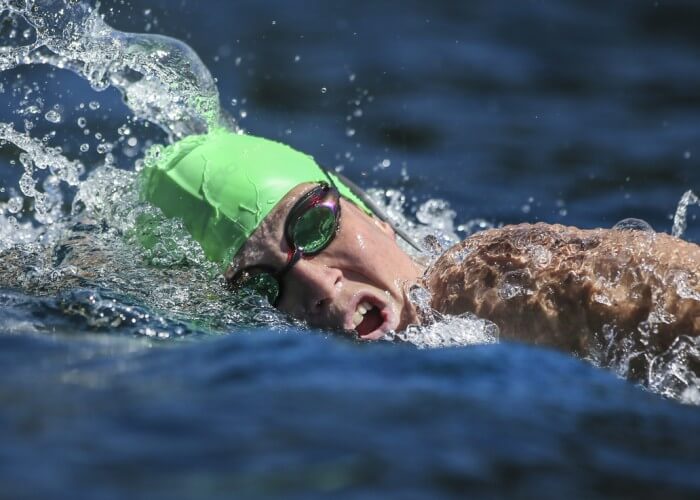
Photo Courtesy: Simon Watts/www.bwmedia.co.nz/Swimming New Zealand
Just as there are differences in mental preparation for pool and open water swimming, physical preparation also changes based on the athlete’s goals. In the same way that the training for each pool distance is unique, training for open water races also varies based on distance. For race distances up to 10k, Kelsheimer recommends that athletes, “prepare like the 1500 [pool race]– depending on the athlete, it might take a bit less rest. They may need to keep the volume up longer toward race day.”
In addition to training volume, some open water swimmers also stress the need to adapt to new and volatile situations. Christie, who is currently training to complete all seven stages of the 8 Bridges Swim, explains that one of the foundations of her preparation is to, “constantly put myself in uncomfortable situations during my training…that way I can roll with the punches come marathon swim time.” While one of the appeals of open water swimming is the excitement of the constantly changing environment, Christie feels that, “nothing will ever scare me because I’ve already simulated it in training, or I have the mental capacity to deal with it and move on in order to execute the goal.” In some ways, mental training for these long swims is even more important than physical training because it helps athletes to overcome pain and obstacles come race day.
3. Emotional Preparation
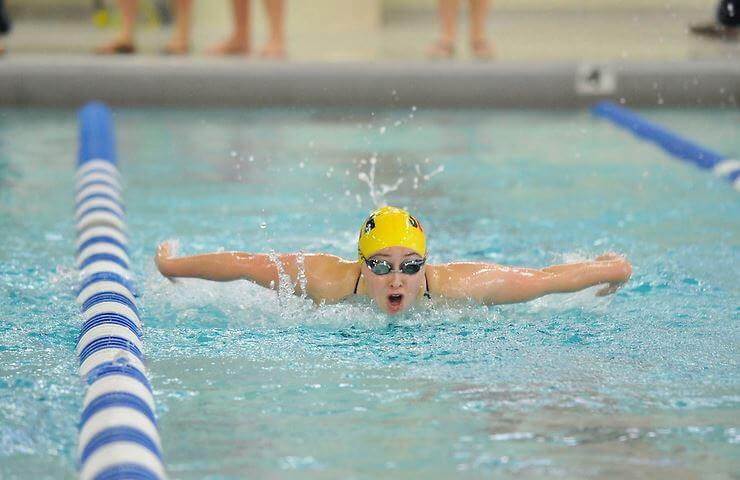
Photo Courtesy: Paige Christie
In both open water swimming and pool racing, emotions can have both positive and negative effects on performance. In the pool, emotional reactions mainly involve success or failure defined by achieving a certain time or place in a given race. In open water, emotions can manifest as doubt in one’s ability to complete a task and also as a factor of the many hours put into training.
Open water swimmers “have to be comfortable with themselves, and find inner resolve and a will to continue when things seem impossible,” Cox says. In this way, swimmers can use their emotions to help them get through the roughest parts of their swims. Just as emotions can help swimmers, Christie also cautions that, “Rapid emotions can ruin even the most prepared swimmer. Doubt in yourself is only removed by actions of preparation. When you’re about to go to bed at night and you are alone with your thoughts you’re going to feel a certain way about your training. Train to feel unstoppable and train to feel like a champion.” By paying enough attention to emotions during training, swimmers can begin to learn how to control them during stressful situations, such as when things don’t go as planned during a swim.
4. Coaching
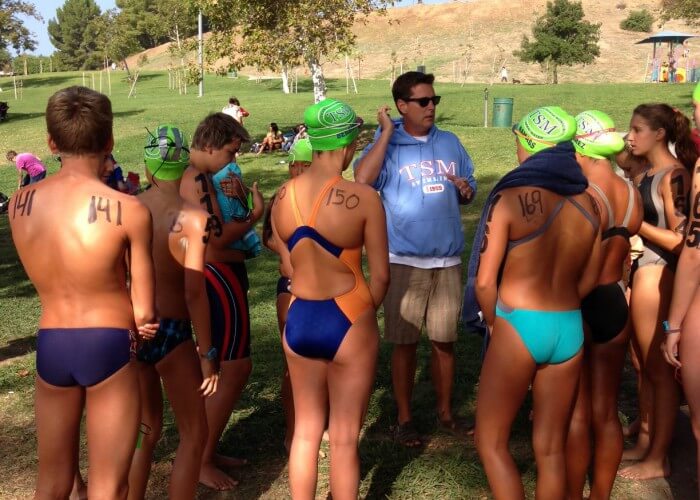
Dave Kelsheimer coaches swimmers before an open water race at Lake Castaic, CA. Photo Courtesy: Cathy Gomez
In the same way that coaching approaches change based on race distance in the pool, there are apparent differences in the way coaches approach training for open water athletes. Kelsheimer, who coaches both pool and open water swimmers at Team Santa Monica in California, explains that one major difference in training for open water is the focus on high yardage rather than speed. He also notes that the “problem with volume is that you really don’t have time to do much of anything else, so it can be hard, though not impossible, to train for both disciplines effectively. While increasing training distances can be extremely beneficial for more experienced swimmers, it can also lead to injury and fatigue if technique is not maintained properly.
“Spend a lot more time working on your technique, your relaxed technique and your breathing,” Kelsheimer recommends for those switching to open water training. “You really need to be overly conscious to about the stress you are putting on your body normally while swimming and then limit that so that you can be as relaxed as possible for as much of the race as possible.” In this way swimmers can preserve their technique and prevent injury even while training for long distances.
5. Motivation
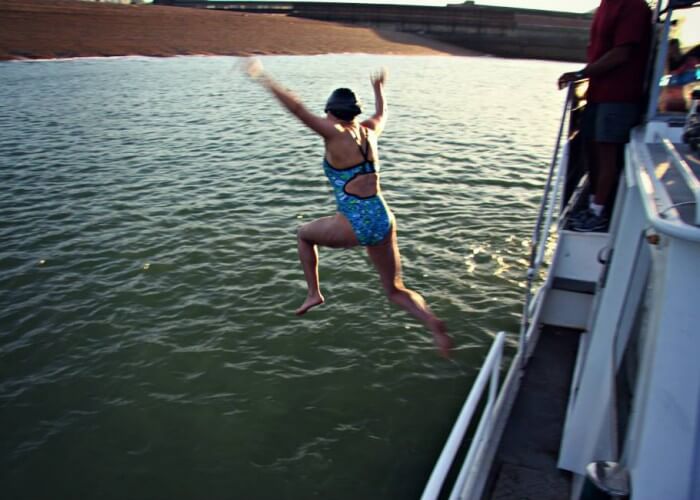
Paige Christie jumps into the English Channel. Photo Courtesy: Paige Christie
Lastly, but perhaps one of the most obvious differences between open water swimming and pool swimming are the reasons that people choose to participate in one discipline over the other. Pool swimmers are of course motivated by a love of the sport, but perhaps also by a desire to win or achieve a certain time. In many ways, these external motivators play a larger role in pool swimming than in open water, maybe because there is more recognition available for pool swimmers in the non-swimming community.
Conversely, open water swimmers are often motivated by the internal desire to complete a goal or even to just finish a swim. “Marathon swimmers are bored with controlled environments,” Cox says. “They seek adventure and love to have new experiences.”
Another feature of open water swimming is that it appeals to people who are burned out with pool racing. It provides a new environment in which to test one’s athletic ability. “Aspiring open water swimmers, get clear on why you are doing the swim and surround yourself with people you trust completely,” Christie advises. “With a strong reason or cause and with people you trust around you, obstacles seem less daunting.” By fully understanding the source of one’s motivation, a swimmer can best train to achieve any goal, whether it be a best time in the 50 free or a successful English Channel crossing.




This is a good writer who is apparently dedicated to her sport!
Reason 4.5 is having an encourager nearby, like in a boat, that believes in you like you believe in yourself and helps you through the rough water.
YES- This is very helpful. I trained for a 1.2(ish) mile swim just for fun and had a kayaker with me. He knew not to tell me if there was a Lions Mane jellyfish on the OTHER side of the boat and I believed him that he’d tell me if I was going to run into a log, a bunch of leaves, or a jellyfish bloom. (i had a lot of fear of things in the water).
I am not an athlete by any means. This was totally a personal goal. OPEN WATER CREATURES AND FEAR were my biggest obstacles. Jellyfish! I swam on my back a lot- I figured if I couldn’t see them, they didn’t exist. The first time I saw a harbor seal kind of startled me too- then I started thinking they were cute and funny and they followed and watched us like puppies.
We swam in a variety of conditions from smooth to choppy.
It was amazing to me how my brain kind of changed on my 4th or 5th choppy water swim. Instead of freaking out, my self-talk turned to “I OWN this wave, I OWN this wave, I OWN this wave, oops- the wave owned me on that one, I OWN this wave.”
The moment I become bait, I stay out. If I get eaten in a pool, I think the world has bigger problems than me in an ocean getting eaten.
I want try open water swimming, still feel anxiety in the ocean. 🙁
Hisham Hosny
Kolinda Schafer lets prep ha
Boat organisation when used is essential. Some considerations – a well versed team, correct timing of feeds, information etc.
Cassidy Heaton
So excited
Me, too! I’m back in the water. Thanks for inspiring me.
Yay!! Glad I could help
Ndumie Marman
There is adventure in open water.
Kathleen Dunt
Danna Sorensen Mirich
I love swimming, both in the pool and open water.
I find myself training specifically for speed in the pool and using a bigger pool perhaps a 50m for mileage swimming.
I was fortunate to have been able to participate in the 7.5km Robben Island to Cape Town swim last month, which was a very humbling experience. I had anxiety leading up to race day even though I had sufficient training behind me. It was all really mental for me. As the race went on, a sense of peace and calmness overcame me and I was thankful to have finished.
The sea is unpredictable, as you up against so many variables, current, wind, temperature and some fish….But I thoroughly enjoyed it.
In summary, follow your goals and allow yourself to be uncomfortable at times, its normal.
Take care